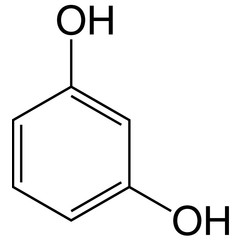You have no items in your shopping cart
Resorcinol
Resorcinol (or resorcin) is an organic compound with the formula C6H4(OH)2. It is one of three isomeric benzenediols, the 1,3-isomer (or meta-isomer). It is a white, water-soluble solid.
Resorcinol is produced in several steps from benzene, starting with dialkylation with propylene to give 1,3-diisopropylbenzene. Oxidation and Hock rearrangement of this disubstituted arene gives acetone and resorcinol.
Although of little commercial value, many additional routes exist for resorcinol. It can be produced when any of a large number of resins (e.g., galbanum, asafoetida, etc.) are melted with potassium hydroxide, or by the distillation of Brazilwood extract. It may be prepared synthetically by melting 3-iodophenol, phenol-3-sulfonic acid, or benzene-1,3-disulfonic acid with potassium carbonate; by the action of nitrous acid on 3-aminophenol or on 1,3-diaminobenzene. Many ortho- and para-compounds of the aromatic series (for example, the bromophenols, benzene-para-disulfonic acid) also yield resorcinol on fusion with potassium hydroxide.

